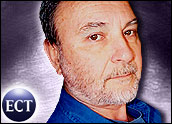
The Recording Industry Association of America may be feeding judges inaccurate technical “evidence” which is being believed as though it comes from a reliable source, according to Ray Beckerman, a New York lawyer who’s representing victims being sued by the Big Four music cartel-owned organization.
“There’s a crisis in this country with the RIAA’s reign of terror,” he said. “The RIAA is bringing massive secret lawsuits against unnamed defendants — ‘John Does’ — who never even know they’ve been sued. These lawsuits wend their way through the courts on an ex parte basis, which means only one side — the RIAA — is represented.”
Analyzing Details
Accordingly, he’s looking for technically savvy allies to help guide judges who may have been misled by RIAA (Recording Industry Association of America) evidence.
He’s posted a riddle on Recording Industry vs. The People, a Web page which, among other things, carries documents relating to the growing number of appeals by RIAA victims.
In an RIAA case a federal judge said a screen shot of defendant John Doe Number 7’s Kazaa shared files folder was enough to show copyright infringement because the, “[RIAA] obtained ‘metadata’ about the files that Doe No. 7 was disseminating, which often reveal who originally copied a particular sound recording from a CD to a computer disk (a process called ‘ripping’) and provide a type of digital fingerprint, called a ‘hash,’ that can show whether two users obtained a file from the same source.
“Using the metadata associated with the music filed that Doe No. 7 was offering for distribution on Kazaa, plaintiffs have determined that many sound recordings were ripped by different people using different brands of ripping software. Such information creates a strong inference that Doe No. 7 was not simply copying his or her own lawfully purchased CDs onto a computer, but had downloaded those files from other P2P users.”
Asking the Experts
Was the judge right or wrong?
The case was Elektra v. Does 1-9.
“I think it would be helpful, when I see an instance in which I think a judge may have been misled by the RIAA on technical issues, to present the judge’s findings to be vetted by the tech community,” says Beckerman.
“I believe the tech community is very much interested in these cases, is very alert to, and mindful of, the extreme danger these cases pose to freedom of expression, and to a climate of technological innovation, and is ready, willing, and able to help ensure that the courts proceed with integrity in these technical areas.”
He says judges are hearing things which, technically speaking, are simply not true and, “some of the judges may actually believe what they’re being told.”
By the time a John or Jane Doe has been named by his or her ISP, and has been sued, “the judge has already been talking to the RIAA’s lawyers, in a complete vacuum, for several years,” adds Beckerman.
Jon Newton, a TechNewsWorld columnist, founded and runs p2pnet.net, based in Canada, a daily peer-to-peer and digital media news site focused on issues surrounding file sharing, the entertainment industry and distributed computing.











































